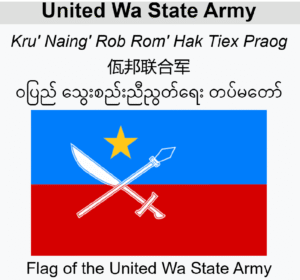MMNN Feature | August 21, 2025
Rakhine’s Political Crossroads: Between Resistance and Allegiance
Note: This article is the ENGLISH translation which was authored in MYANMAR by Zaw Thaik and reflects his personal views. It is not affiliated with Arakan Bay News. Responses or counter-articles may be sent to [email protected].
Overview
In today’s political climate, the Rakhine people find themselves at a pivotal moment—rallying around a shared nationalist vision while resisting military dictatorship. Yet, on the other side of this historic journey toward a new Arakan, some prominent Rakhine figures have aligned themselves with the military regime led by Min Aung Hlaing, supporting its continuity through political, administrative, and legal channels.
Key Figures and Their Roles
The article highlights several influential individuals whose current and past actions have shaped Rakhine’s political landscape:
Daw Aye Nu Sein
- A well-known lawyer and former Vice Chair of the Arakan National Party (ANP).
- Gained prominence for defending civilians during the early AA conflict and criticizing the military in public forums.
- Accepted a senior advisory role in the junta’s National Defense and Security Council post-2021 coup.
- Sanctioned by the EU, US, and Australia for her cooperation with the military regime.
- Her silence on human rights abuses in Rakhine has drawn criticism, especially as she enjoys privileges in Naypyidaw.
Dr. Aye Maung
- Former ANP Chair and MP, now founder of the Arakan Front Party (AFP).
- Once a vocal nationalist, he was imprisoned in 2019 for alleged treason but released after the coup.
- His recent alignment with the junta and participation in its political roadmap has led to accusations of abandoning nationalist ideals.
- He is reportedly lobbying for legal reforms to allow former convicts to contest elections.
- (Translator’s note: He was responsible for inviting Myanmar Military into Rakhine, incited and participated in Rohingya Genocide.)
Daw Saw Mya Raza Lin
- A senior figure in the Arakan Liberation Party (ALP), historically a pro-independence armed group.
- Took control of ALP after internal splits and rebranded it as the Army for Liberation and Peace of Rakhine (ALPR).
- Actively involved in junta-led peace talks and NCA processes, but now faces dwindling public support.
- Her faction is accused of aiding the military in surveillance and arrests, and was allegedly complicit in the May 2024 massacre in Byaing Phyu village.
U Zaw Aye Maung
- Former senior leader of the Arakan National Party (ANP) and ex-Minister for Rakhine Ethnic Affairs in Yangon Region.
- Currently serves as Deputy Minister for Ethnic Affairs under the military-led Union government.
- Despite limited control over ethnic regions, the junta has elevated him under the banner of ethnic representation.
- His tenure in Yangon was marked more by ceremonial events than substantial advocacy for Rakhine people.
- Frequently appears in junta propaganda videos, urging Rakhine youth in Yangon to embrace “Union spirit.”
- Allegedly involved in the arrest of politically active Rakhine youth post-coup.
Daw Nu Mya Zan
- Deputy Minister for Religious and Cultural Affairs under the junta.
- Appointed to support Min Aung Hlaing’s image as a guardian of traditional culture and religion.
- Tasked with promoting historical narratives of ancient Burmese capitals and monarchs.
- Remained silent following the junta’s bombing of Mrauk-U Cultural Museum, a symbolic site for Rakhine heritage.
- Has ignored military encroachment on ancient temples and pagodas, including construction of bunkers.
- Awarded a “Distinguished Service Medal” by the junta and now resides comfortably in Naypyidaw.
U Ba Shain
- Former MP from Kyaukphyu Township and founder of the Rakhine Nationalities Party (RNP).
- Seeking political opportunity through junta-backed elections.
- Participated in the 2025 Peace Forum and received party registration from the junta’s election commission.
- Previously a top ANP leader, but rebranded under RNP after ANP was deregistered.
- Accused of prioritizing personal gain over nationalist ideals, with ambitions for ministerial or parliamentary roles.
- Campaigning under the guise of Rakhine interests, targeting votes from displaced Rakhine communities.
U Hla Thein, U San Shwe Maung, Dr. Aung Kyaw Min, U Than Tun
- These individuals are considered loyalists at the state level, supporting the junta despite its declining control in Rakhine.
- U Hla Thein, the junta-appointed Chief Minister of Rakhine State, remains largely silent despite his official spokesperson role.
- U San Shwe Maung, the junta’s Minister for Economic Affairs, has little influence due to the region’s economic collapse.
- Dr. Aung Kyaw Min was previously promoted to Chief Minister and later to Union-level junta member, but has since faded from public view.
- U Than Tun (Kyarchay), a retired teacher known for anti-Muslim rhetoric, was appointed Minister for Natural Resources post-coup. He has since passed away.
Reflection and Final Thoughts
The article concludes with a poignant reflection:
“No one is born without purpose. Each individual leaves a mark in the history of their nation and people.”
It argues that the long-held dream of Rakhine nationalism is now at its most suppressed, yet also at a turning point. The author suggests that Arakan will soon break free from military rule, and those who have supported the junta—whether at Union or State level—will be remembered not as patriots, but as collaborators. Future generations may view them as cautionary tales rather than role models.





